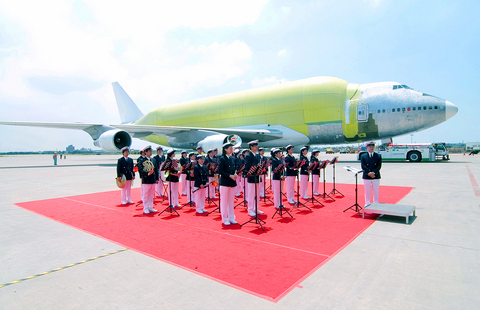Evergreen Aviation Technologies Corp (EGAT, 長榮航太) yesterday unveiled its first converted cargo jet for Boeing Co, marking a breakthrough in the nation's aviation industry.
"It was a tough task for us as the jet modifications involved a large number of components and there was a pressing timeline for completion," EGAT chairman David Wang (王宜恭) said in a rollout ceremony at CKS Airport in Taoyuan.
In February last year, EGAT signed a deal with the US aerospace giant to convert three Boeing 747-400 passenger jets into 747-400 Large Cargo Freighters, marking the first such contract for the local aviation industry.

PHOTO: AP
Modifications for the second jet will be completed by the end of the year, while the third will be finished next year, according to Wang.
The converted cargo jets are said to be capable of carrying more cargo than other freighters, with a volume of 1,840m3, three times the size of the original Boeing 747-400 jet.
The modified jets also boast a unique "swing tail" design that allows fast, easy loading and unloading of the huge cargoes.
The aircraft will allow cargo delivery times to be drastically reduced, the companies said.
Over the next four years, the new cargo freighters will be used to transport to transport giant-sized Boeing 787 "Dreamliner" assemblages from around the world to the assembly site of the new aircraft in Everett, Washington.
Depending on the model, the mid-size Boeing 787s are able to carry between 210 to 330 passengers on routes of 5,000km to 16,000km.
The first Dreamliner -- which is competing with the delayed Airbus A350 -- will come out next year, with delivery and service expected in 2008.
Since the 787 program was launched in April 2004, 32 airlines have placed 424 orders with a value of US$59 billion, according to Boeing.
"This is the most successful and largest launch of a new commercial aircraft [in Boeing's history]," said Scott Strode, Boeing 787 vice president of airplane development and production.
He said the fleet of three cargo jets from EGAT will be able to meet supplies for the 787 during over the next few years, and the company will evaluate more possible orders depending on future demand for 787.

Micron Memory Taiwan Co (台灣美光), a subsidiary of US memorychip maker Micron Technology Inc, has been granted a NT$4.7 billion (US$149.5 million) subsidy under the Ministry of Economic Affairs A+ Corporate Innovation and R&D Enhancement program, the ministry said yesterday. The US memorychip maker’s program aims to back the development of high-performance and high-bandwidth memory chips with a total budget of NT$11.75 billion, the ministry said. Aside from the government funding, Micron is to inject the remaining investment of NT$7.06 billion as the company applied to participate the government’s Global Innovation Partnership Program to deepen technology cooperation, a ministry official told the

Taiwan Semiconductor Manufacturing Co (TSMC, 台積電), the world’s leading advanced chipmaker, officially began volume production of its 2-nanometer chips in the fourth quarter of this year, according to a recent update on the company’s Web site. The low-key announcement confirms that TSMC, the go-to chipmaker for artificial intelligence (AI) hardware providers Nvidia Corp and iPhone maker Apple Inc, met its original roadmap for the next-generation technology. Production is currently centered at Fab 22 in Kaohsiung, utilizing the company’s first-generation nanosheet transistor technology. The new architecture achieves “full-node strides in performance and power consumption,” TSMC said. The company described the 2nm process as

Shares in Taiwan closed at a new high yesterday, the first trading day of the new year, as contract chipmaker Taiwan Semiconductor Manufacturing Co (TSMC, 台積電) continued to break records amid an artificial intelligence (AI) boom, dealers said. The TAIEX closed up 386.21 points, or 1.33 percent, at 29,349.81, with turnover totaling NT$648.844 billion (US$20.65 billion). “Judging from a stronger Taiwan dollar against the US dollar, I think foreign institutional investors returned from the holidays and brought funds into the local market,” Concord Securities Co (康和證券) analyst Kerry Huang (黃志祺) said. “Foreign investors just rebuilt their positions with TSMC as their top target,

POTENTIAL demand: Tesla’s chance of reclaiming its leadership in EVs seems uncertain, but breakthrough in full self-driving could help boost sales, an analyst said Chinese auto giant BYD Co (比亞迪) is poised to surpass Tesla Inc as the world’s biggest electric vehicle (EV) company in annual sales. The two groups are expected to soon publish their final figures for this year, and based on sales data so far this year, there is almost no chance the US company led by CEO Elon Musk would retain its leadership position. As of the end of last month, BYD, which also produces hybrid vehicles, had sold 2.07 million EVs. Tesla, for its part, had sold 1.22 million by the end of September. Tesla’s September figures included a one-time boost in